

Here's Why China Might Not Cut Interest Rates After All. No Guarantee. In my debate with Andrew Batson in The Guardian in March, I noted that: There really are two related but distinct things people have in mind when they talk about a “hard landing” for China.
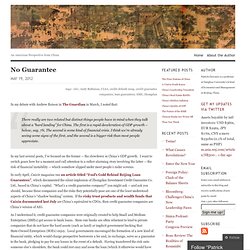
The first is a rapid deceleration of GDP growth – below, say, 7%. The second is some kind of financial crisis. I think we’re already seeing some signs of the first, and the second is a bigger risk than most people appreciate. In my last several posts, I’ve focused on the former — the slowdown in China’s GDP growth. In early April, Caixin magazine ran an article titled “Fool’s Gold Behind Beijing Loan Guarantees”, which documented the silent implosion of Zhongdan Investment Credit Guarantee Co. As I understand it, credit guarantee companies were originally created to help Small and Medium Enterprises (SMEs) get access to bank loans.
Now putting aside what happened at Zhongdan for a moment, let’s just consider what this means. Lest you think Zhongdan was just a colorful outlier, think again: Indeed. Fool's Gold Behind Beijing Loan Guarantees. A credit guarantee firm is accused of using 'wealth management' schemes in a game its clients and banks also played The domino effect began in January when bankers reacted to rumors of a liquidity crunch at one of Beijing's most prominent loan-guarantee firms, Zhongdan Investment Credit Guarantee Co.
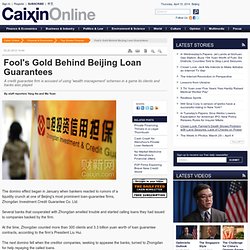
Ltd. Several banks that cooperated with Zhongdan smelled trouble and started calling loans they had issued to companies backed by the firm. At the time, Zhongdan counted more than 300 clients and 3.3 billion yuan worth of loan guarantee contracts, according to the firm's President Liu Hui. The next domino fell when the creditor companies, seeking to appease the banks, turned to Zhongdan for help repaying the called loans. But Zhongdan executives balked, and the domino effect accelerated as companies teetered under bank pressure and the city's business community shuddered with credit freeze fears. A Beijing-based credit guarantee company is going bust. Back in May, Patrick Chovanec of Tsinghua University of Beijing highlighted the risks of credit guarantee companies. Similar to the mutual and collective guarantees we mentioned recently (e.g. that 600 companies that were dragged down, or some steel companies that were dragged down), some companies could only obtain bank loans in another company was willing to provide guarantee, and these companies ended up guaranteeing loans for each other.
Government Funds Ease Zhejiang Crisis - Economic Observer News- China business, politics, law, and social issues. Summary: Local governments across Zhejiang have established emergency funds to help private enterprises cope with a deepening loan crisis that was triggered after executives at four Zhejiang companies fled town.
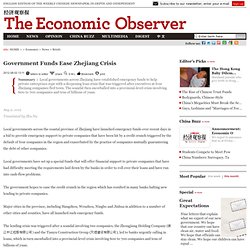
The scandal then snowballed into a provincial-level crisis involving 600 to 700 companies and tens of billions of yuan. Aug 2, 1012Translated by Zhu Na Local governments across the coastal province of Zhejiang have launched emergency funds over recent days in a bid to provide emergency support to private companies that have been hit by a credit crunch triggered by the default of four companies in the region and exacerbated by the practice of companies mutually guaranteeing the debt of other companies. Local governments have set up a special funds that will offer financial support to private companies that have had difficulty meeting the requirements laid down by the banks in order to roll over their loans and have run into cash-flow problems.
China's house prices to drop 80% over 20 years: Andy Xie|Economy. Apartment complexes in Wuhan, Hubei province.
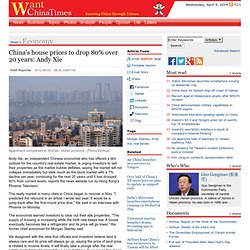
(Photo/Xinhua) Andy Xie, an independent Chinese economist who has offered a dim outlook for the country's real estate market, is urging investors to sell their properties as the market bubble deflates, saying the market will not collapse immediately but slide much as the stock market with a 7% decline per year, continuing for the next 20 years until it has dropped 80% from current levels, reports the news website run by Hong Kong's Phoenix Television. China Power. “We are moving away from a U.S. – or Europe-led world to a world led by China,” writes Stephen King, Chief Global Economist at HSBC in a report released on Wednesday.
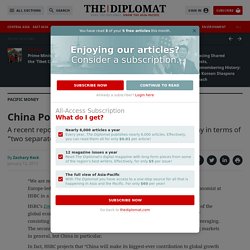
HSBC’s Emerging Market Index for the last quarter of 2012 tells investors to think of the global economy in terms of “two separate narratives.” The first is the “old world” consisting of the U.S. and Europe, which continue to experience an ongoing deleveraging. The second is the “new world” consisting of the “structurally dynamic” emerging markets in general, but China in particular. In fact, HSBC projects that “China will make its biggest-ever contribution to global growth in 2014.” Part of this is attributable to a slight improvement in China’s economy, which HSBC expects will grow by 8.6% in 2013, up from 7.8% in 2012.
Still the slower rate of growth is not as consequential as one might expect, at least in terms of China’s impact on the world economy. Enjoying this article? It was hardly alone. How Much Power Does China's 'People's' Army Have? How far, asks Peter Mattis, does the PLA’s power extend into government?
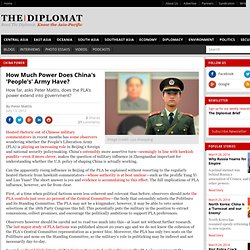
By Peter Mattis for The Diplomat July 13, 2012 Facebook0. Everything You Need To Know About China's Delicate Shadow Banking System.